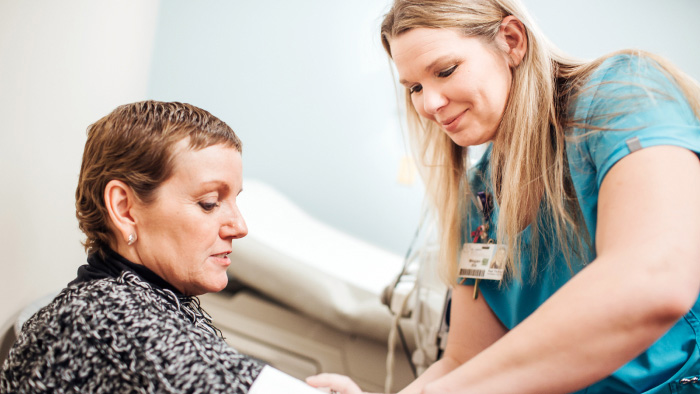The downside to chemotherapy is that its side effects can be unpleasant including nausea, vomiting, hair loss and mouth sores. Your doctor will use new and effective approaches to prevent or moderate these side effects to make treatment as painless as possible. In addition to the standard chemotherapy protocols, your doctor continually revises chemotherapy protocols to reflect new and better treatment, including many clinical studies available as treatment options.
Chemotherapy
When you receive chemotherapy treatment at the Cancer Care Center, we understand that you are not just fighting against cancer—you are also fighting for the things that matter in life.

Our staff provides you with more than just medicine. We offer you truly compassionate care that you will find only at St. Mary’s.
Chemotherapy is a cancer treatment using drugs that are given intravenously through an injection or by mouth. These drugs destroy cancer cells by impeding their growth and reproduction. Your doctor may recommend chemotherapy alone or in conjunction with radiation therapy or surgery depending on what course your team decides is best.
Because every patient is unique, our chemotherapy treatment protocols can vary widely. Your chemotherapy treatment is designed to fight your cancer by keeping your specific diagnosis, medical history and treatment goals in mind. As such, different patients experience chemotherapy in different ways. For more information about what generally what to expect during chemotherapy, visit our frequently asked questions below.

Side effects of chemotherapy
Treatment Planning
Because we care about you as a person, not just a cancer patient, we want you to understand every step of your treatment process. Most patients are referred to us after specialists have completed tests that show if cancer is present and at what stage. At this point, your personalized treatment begins with a pre-treatment consultation with one of our medical oncologists. During the consultation, your medical oncologist will review your medical records, perform a complete physical exam, confirm your diagnosis and discuss treatment goals, strategies and options. Your treatment plan will vary according to your type of cancer, treatment goal, drugs used and how you personally respond to the treatment.
We encourage you to have a family member or significant other accompany you to this visit. There will be a lot of information discussed at the consultation, so it’s helpful to have a supportive friend there to help you process the information, ask questions and take notes.